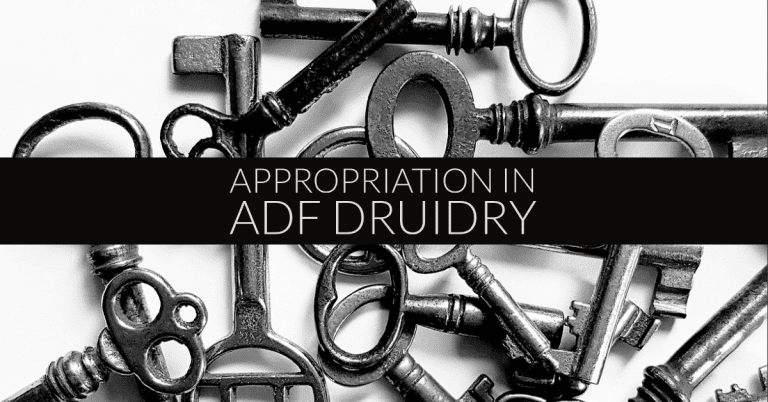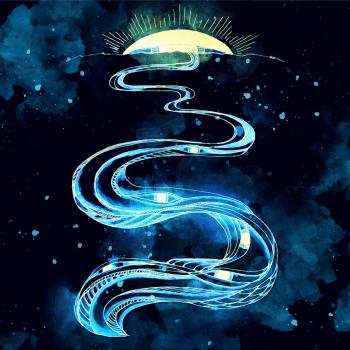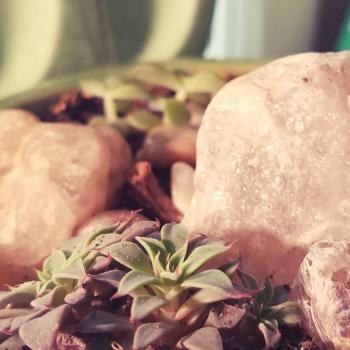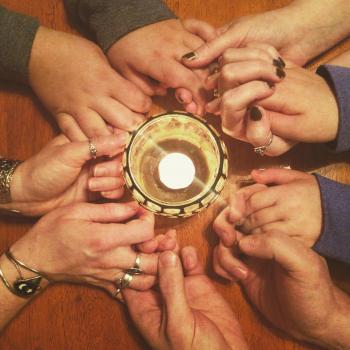It’s tough for me to write this. But I think this needs to be said, and said loudly. After many years working in building sustainable religious traditions that focus on healing the earth I came to understand how crucial social justice is to that work. I studied intersectional feminism, consent, boundaries, the history of the civil rights and woman’s suffrage movements, and the expression of racism in American systems and institutions. It’s been about 5 years of study now and I’m still not done yet. I studied organic agriculture for about a decade, so I figure I’ve got at least 5 more years before I really know my stuff.
I need to say this now. I can’t wait five more years. My ethics, my community, my gods and my spirits are all in alignment.
Our ADF Druidry Gatekeeper concept comes directly from Papa Legba and the way he is invoked in Voudoo. You won’t read about it in our documentation. It wasn’t until I was researching the gatekeeper concept for my priestwork classes that I understood it, by talking to the elders of my tradition. We do this without acknowledging this fact or giving any credit to African traditions. Our rules specifically ban any non Indo-European deity from being any part of the ritual except for the praise offerings portion.
Here is an excerpt from my capstone project for my level 1 priest work. It’s from a class called Discipline 1. We are asked to explain our relationship to the Earth Mother and Gatekeeper. I’m not real proud of it now. It was read and passed by my reviewer, indicating that all information was accurate and understood by our Clergy Council.
“As I have explored the concept of the gatekeeper I found information that indicated the concept was not originally Indo-European. That has caused some dismay and concern as I have tried to understand how such a central part of our liturgy could be pulled from an outside source. Personally I don’t mind mixing in a bit of outside theology, but the question remains: if we only use Indo-European symbology and cosmology, what are we doing including an African deity concept? It is as if at the base of our theological structure we have a fracture, a broken rule. So I delved into the concept. In the Hatian Voudoun tradition Papa Legba is the god who reaches between the gods and humanity. He is the first and last honored because he stands at the crossroads.
In my own experience with these discipline rituals one thing I have come back to again and again is the simple act of keeping the fire lit. I’ve been outside in the snow trying to light wet wood while it slowly sinks into the melting ice. I’ve been inside trying to burn tiny offerings in a cauldron while it fills the house with smoke. I’ve tended tiny fires, and large ones. I’ve let them go out in the middle of ritual when I was doing trance work, or if my daughters needed my help. The physical act of fire tending has become a metaphor for the process of working on my clergy training. I need more than the materials, whether they be books or wood. It’s the attention and persistence needed to continue that is essential. To tend the fire has become its own sacrifice, an offering in its own right. I have found that when I don’t have some sort of fire for my rites I usually get a poor omen. The fire is essential to my work.
However I am beginning to see that in the allure and brightness of the fire we can forget the other hallows. We cannot forget the well and the tree. I am starting to see the edge of an idea that excites me. Puhvel speaks about gods that tend the sacred water. Nechtan and Apam Napat are both reflexes of this god, the “son of the waters” What if this god is similar to Hestia and Aushrine? What if he is in fact the one who tends to the hallow of the well? What if each of the hallows is so sacred that it has attendants, both human and non-human? I am beginning to think that we did not, after all, steal an idea from an African tradition. I think we found the words to describe one of our own. What if the gatekeepers are not the ones who reach out into the cosmos, who connect humanity to the other deities. What if the are literally the Keepers of the Gates. The beings who guard and tend to our most sacred things. Those who know the mysteries of these symbols that we see again and again in Indo-European religion. What if the aid they give us is their knowledge, their persistence and their long quiet tending of the well of wisdom and healing, the fire of transformation, and the tree of all the worlds?”

I read it now and I see how with clever words I ignored the fact that we did in fact steal an idea without giving proper credit. For a group of people obsessed with citing our sources, we do a horrible job of citing this source. The writing of a number of Black women have assisted me in seeing my blind spots. I realize now that I did what white women excel at: I made harmony where I should have set a boundary. I should have said, “Wait, this is wrong.” Instead I wrote pretty words to make it okay:
“I am beginning to think that we did not, after all, steal an idea from an African tradition. I think we found the words to describe one of our own.”
Oh, past self, you were being such a jerk right there. Yeah, actually we did. We stole, and continued to colonize other culture’s traditions, just like always.
*hangs head in shame*
I think that it could be done right, possibly, but certainly hasn’t been. I think that if we were very public about what was done, if we went to Voudoo priests and came into reciprocity with them, maybe they could help us to learn how to come into right relationship. If we were willing to find ways to do it honestly and ethically. I think it would take so much integrity, honesty, hard work. I see how my elders resist and I cannot imagine changing the minds of so many people. I find it highly unlikely to actually be a solvable problem.
I was surprised when the gatekeeper issue was recently brought up by another priest on the ADF Clergy Council E-list. Here was my response:
“The thing that I see is not being brought up is that stealing the Gatekeeper concept from Afro-Caribbean religion was wrong. Ethically wrong. Like in the cultural appropriation we ought to be ashamed of ourselves way. I’m all for redoing the core order, but unless we grapple with the reality that we’ve been busily doing what white people have been doing for a very long time, we’re going to continue doing that sort of thing. We make statements that decry White terrorism, but we really ought to be doing the work to examine our own systemic racism. The underlying reason we make the change is as important as the change itself. Will we be honest about the fact that we stole from minority religion? Will we attempt to make reparations in any way?
Personally I’ve been giving offerings to Papa Legba for about a year now. As an ADF priest. As an apology. I have little hope that this council will deal with the ethical issues of what happened. I remember when [name omitted] brought this issue up the first time, but it was never in a context of unethical behavior, only in the context of it not being IE.
We are supposed to be leaders. Leaders see hard truths and articulate them. I would challenge each of you:
How do we deal with this in an ethical, honest, and compassionate manner?”
So I will wait and see what happens. Maybe this post will help bring the damage out into the healing sunlight. Maybe we can grapple with how to move forward ethically rather than sweeping it under the rug. I don’t know. I will keep giving my weekly offerings to Papa Legba. In my experience he’s surprisingly kind and understanding. The only thing we can do is keep trying. So I keep trying. May the gods and spirits bless us with the wisdom to do the work well.
















